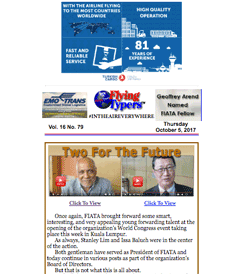

#INTHEAIREVERYWHERE
 |
 #INTHEAIREVERYWHERE |
| Vol. 16 No. 82 | Thursday October 12, 2017 |
IATA Loses India Agents Beef Again |
In what can best be described as another round in the International Air Transport Association (IATA) versus Air Cargo Agents Association of India (ACAAI) battle, India’s Competition Commission (CCI) recently dismissed allegations of unfair business practices made against ACAAI and its office bearers with regard to implementation of Cargo Accounts Settlement System (CASS). The Case & Verdict IATA filed the complaint
alleging ACAAI and its office bearers had colluded and were collectively
boycotting business with those carriers that were keen to implement the
web-based online billing and settlement system, CASS, in India. Back To Beginnings The Air Cargo Agents Association
of India (ACAAI) filed a complaint with the Competition Commission of
India (CCI) back in December 2012 against the “anti- competitive
activities of International Air Transport Association (IATA) in India.”
The CCI sent the case for investigation to the office of the Director
General Investigation (DG). ACAAI Sends Out An Appeal In June 2015 ACAAI was
not satisfied by the CCI’s order claiming it was wrong on facts
as well as law. IATA Well-Calculated Strategy IATA filed a new complaint
with the CCI against ACAAI on June 7, 2017. Trumped Up Charges ACAAI sources pointed
out that IATA attempted to make untenable allegations to the effect that
ACAAI was in violation of the provisions of the Competition Act by compelling
its members not to sign up for the Cargo Accounts Settlement System (CASS)
program IATA has been seeking to enforce in India. Long Festering Issues The problems between IATA
and ACAAI—or rather the ACAAI members—have been continuing
for a long time and include the implementation of CASS. Count Us Out As Collaborators ACAAI also stated that it did not want to find itself in a situation where, if IATA were found to be indulging in any anti-competitive practice in India, ACAAI would be construed as an unwitting collaborator acting in concert with such practices, whether voluntarily or otherwise. ACAAI’s position was that the CCI was required to examine the facts that unilaterally determined the polices that governed air cargo agents, prescribe the qualification and conditions for the accreditation and retention of air cargo agents, act in a self-acclaimed regulatory capacity, determine the commission (or its exclusion, for example, in recovering fuel surcharge on behalf of the airlines) payable to agents, determine norms for air cargo agents and also determine if IATA’s functions amounted to macro-economic cartelization. Following The Money It was further pointed
out that determination of financial criteria, penalty for non-compliance,
and exclusion of fuel surcharge from payment of commission to agents as
set out which prejudicially affected the air cargo agents so far, would
amount to micro-economic cartelization. |
If
You Missed Any Of The Previous 3 Issues Of FlyingTypers Access complete issue by clicking on issue icon or Access specific articles by clicking on article title |
||
 Vol. 16 No. 79 Two For The Future Chuckles for October 5, 2017 YIFFY Steps Out Smartly In Kuala Lumpur Number 9 For EMO China Delta & Virgin Team Up Pharma Why QR Added B747-8F Remembering Richard Malkin |
 Vol. 16 No. 80 CNS President Quits Air Cargo Chuckles for October 6, 2017 Malaysia Heats Up FIATA 2017 Air Cargo Aid Hangs Tough As Need Expands |
|
Publisher-Geoffrey
Arend • Managing Editor-Flossie Arend • Film Editor-Ralph Arend • Special Assignments-Sabiha Arend, Emily Arend • Advertising Sales-Judy Miller |
|